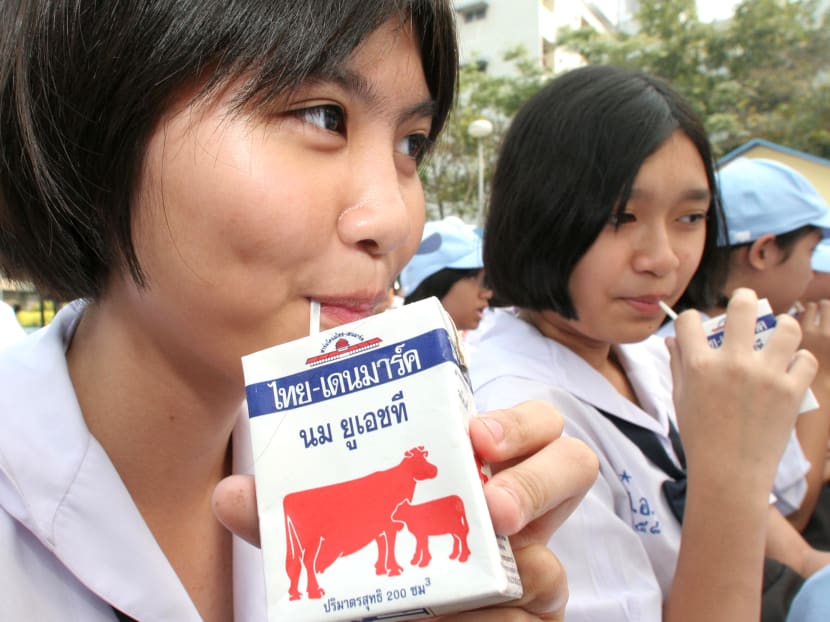Thais urged to drink more milk
BANGKOK — One in five women in Thailand aged between 40 and 80 suffers from osteoporosis, says the United Nations (UN), prompting calls for Thais to drink more milk.

Children drink milk in a campaign to promote milk consumption. Photo Credit: Bangkok Post
BANGKOK — One in five women in Thailand aged between 40 and 80 suffers from osteoporosis, says the United Nations (UN), prompting calls for Thais to drink more milk.
Osteoporosis is a condition where bones lose strength and density, and sufferers have a higher chance of developing fractures.
In the past 30 years, hip fractures among females aged between 40 and 80 have been increasing, said Mr Vinod Ahuja, a Bangkok-based livestock policy officer with the UN’s Food and Agriculture Organisation (FAO).
Osteoporosis is particularly prevalent among Thais living in rural areas.
This does not bode well for Thailand, which is set to become an ageing society in two decades. By 2030, citizens aged 60 and over will account for 19 million, or one-third of the total population.
Hip fractures are the sixth-leading cause of death in Thai women. Among those who have sustained hip fractures and survived, studies show, 22 per cent are unable to walk, 10 per cent have to use walking aids, while the rest have a lower quality of life, even if they can walk independently.
Seniors in rural areas who break their hips are often treated at home using herbal medicine with little or no curing properties. They do not seek surgical treatment that helps them heal faster. Treatment is also expensive.
One of the major reasons for the high incidence of osteoporosis is insufficient calcium intake in the diet.
Calcium-rich foods such as milk and dairy products do not feature highly in Thai cooking. Drinking milk benefits physical growth in children and helps them to build up a reserve of calcium to protect against osteoporosis in later life, say experts.
The problem is that Thais, whether old or young, do not drink enough milk, according to the latest national survey by Thailand’s National Statistical Office. On average, a Thai person consumes only 14 litres of milk a year – four to seven times less than residents in other Asian countries.
Typically, Asians already consume less calcium than is recommended. The International Osteoporosis Foundation has found that the average dietary calcium intake in Asia is less than half of the FAO-WHO recommendation of 1,000-1,300mg a day.
In Thailand, said Mr Vinod, the state has focused on feeding children milk through the school milk programme and consumption is limited to school hours. Youngsters should also drink milk at home, while adults need to be encouraged to include milk in their routine diet.
He said some evidence shows that introducing regular consumption of milk to older women and men can help those who have had a low calcium intake throughout their lives.
But persuading older Thais to drink milk to avoid osteoporosis can be a challenge, said Dr Atthaphon Kaewsamrit, deputy director-general of the Department of Health. He said milk remains “alien” to many Thais, while osteoporosis is not among the government’s priority diseases to tackle, unlike other non-communicable illnesses such as cancer and high-blood pressure.
Ms Sa-nga Damapong, a nutritionist at the Thai Health Promotion Foundation said an improvement in awareness and education of the Thai people is the best public health strategy for preventing osteoporosis.
At the same time, there is an urgent need to place the prevention of osteoporosis on the national health agenda.
“We can prevent osteoporosis now by starting (the habit of drinking) milk, which provides an inexpensive source of calcium,” said Dr Atthaphon. “It’s better to do it now than be sorry later.”
Mr Vinod said it was time to educate both young and adult Thais about the benefits of consuming milk. He believes drinking is a simple way for people of all ages to strengthen their bones.
Higher demand for milk can also generate jobs, such as in the areas of pasteurisation, distribution and production of related dairy products, such as yoghurt, he added. BANGKOK POST






